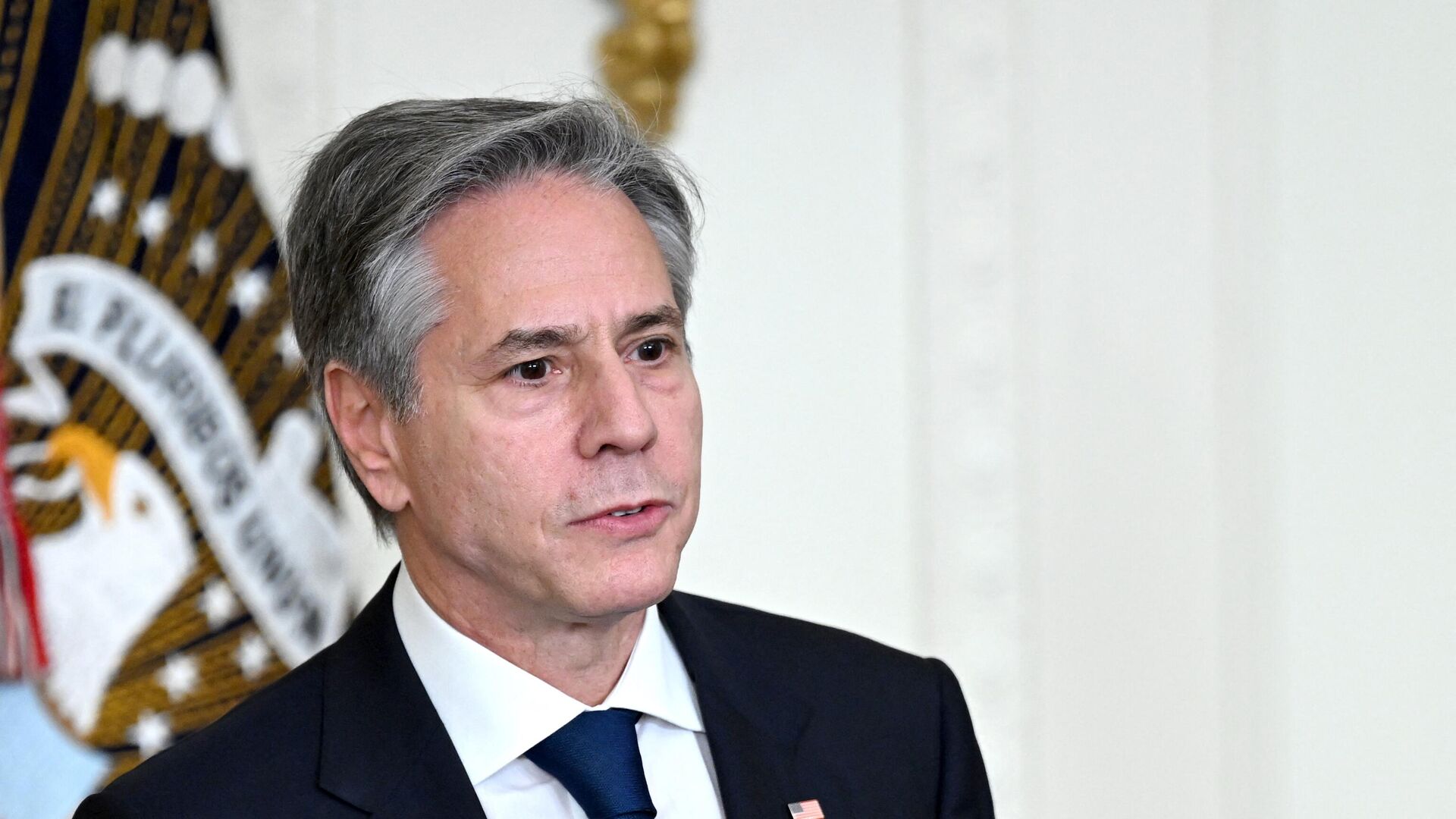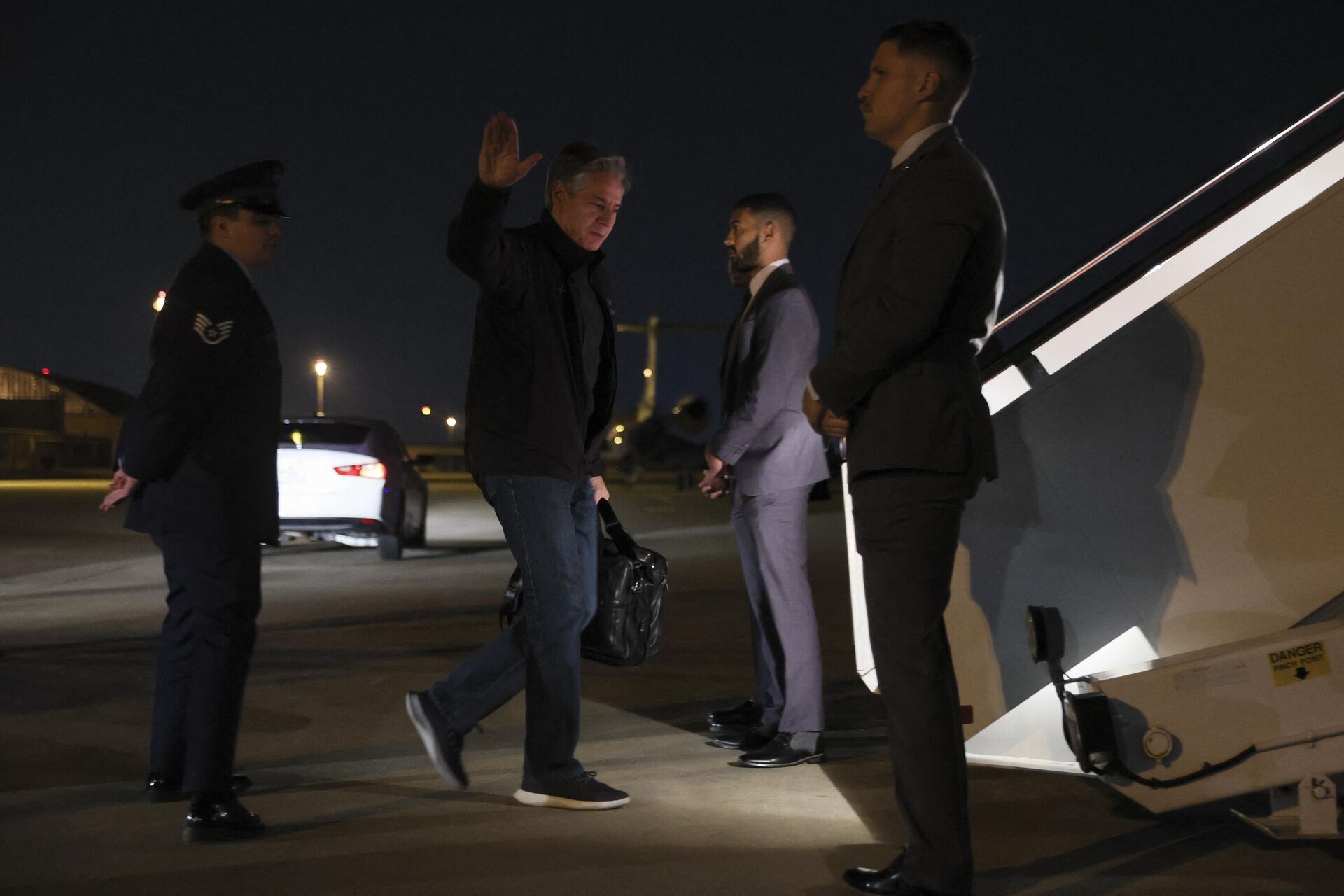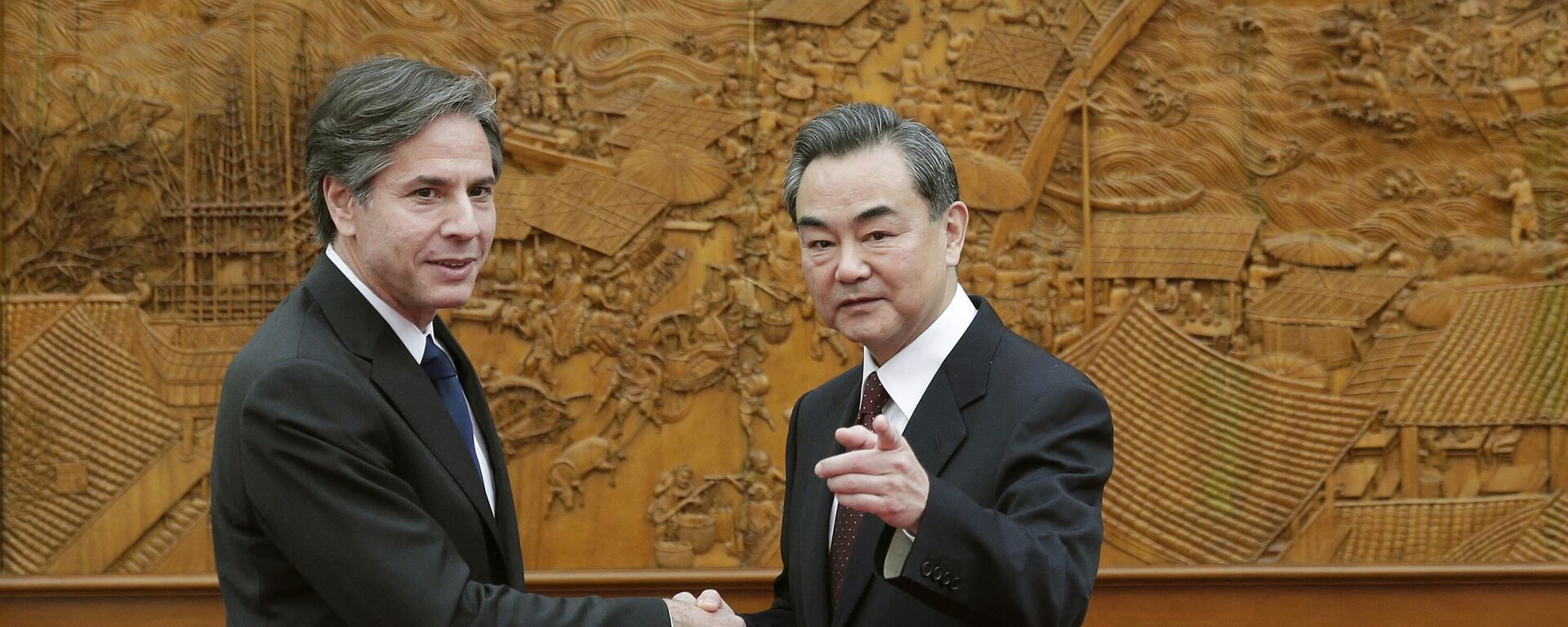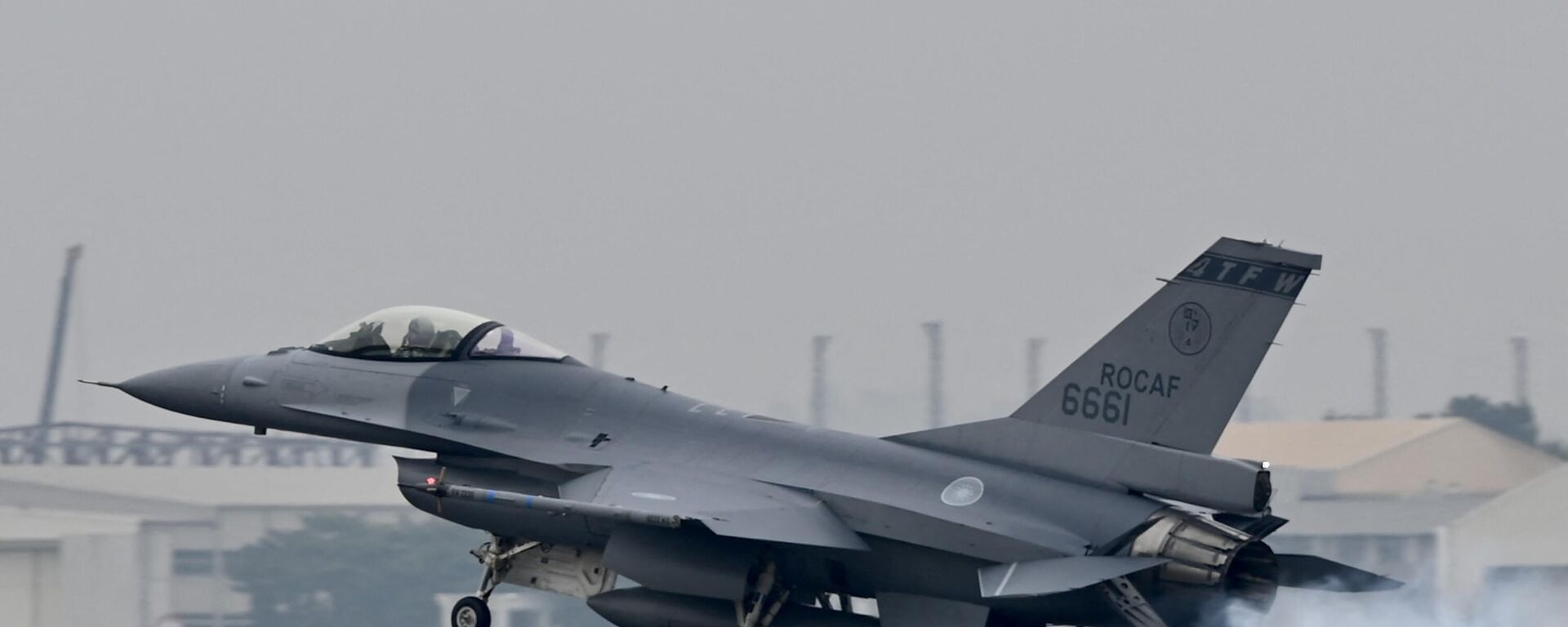https://sputnikglobe.com/20230617/china-warns-us-against-strategic-misjudgment-as-blinken-heads-to-beijing-1111239478.html
China Warns US Against ‘Strategic Misjudgment’ as Blinken Heads to Beijing
China Warns US Against ‘Strategic Misjudgment’ as Blinken Heads to Beijing
Sputnik International
Blinken arrives in Beijing this weekend in what will be his first trip to China as the secretary of state, a visit that was delayed in February, when Washington tracked a suspected Chinese surveillance balloon in US airspace.
2023-06-17T07:24+0000
2023-06-17T07:24+0000
2023-06-17T07:24+0000
world
us
china
antony blinken
visit
trip
relations
issues
https://cdn1.img.sputnikglobe.com/img/07e7/06/11/1111239144_0:0:3072:1728_1920x0_80_0_0_6e7ce29da8368a9d27e4cb9e276f7781.jpg
The US views China as its “primary rival” and “the most consequential geopolitical challenge,” which is “a major strategic misjudgment,” Chinese Foreign Ministry Spokesperson Wang Wenbin has stated.Speaking to reporters ahead of US Secretary Antony Blinken’s visit to China slated for this weekend, Wang said that while there is a competition between the two countries in such fields as economics and trade, there should be “no vicious zero-sum competition,” as well as no attempts to contain or suppress one another in the name of rivalry and deprive China of its legitimate right to development.He called on the US to give up the illusion of dealing with China "from a position of strength," adding that both sides should bolster relations on the basis of mutual respect and equality, respect their difference in history, culture, social system and development, and accommodate each other's core interests and major concerns.Wang underscored that the two’s relationship “needs to serve an actual purpose and help provide solutions.” According to him, “What is unacceptable is to ask for communication and meanwhile damage the other side's interests. One can't say one thing and do another."When asked about Blinken's China visit-related agenda, the spokesperson said that the two sides plan to exchange views on bilateral relations as well as pressing international and regional issues of mutual interest, among other things.The remarks come a few days after State Department spokesperson Matthew Miller said in a statement that while in Beijing, “Secretary Blinken will meet with senior PRC [People’s Republic of China] officials where he will discuss the importance of maintaining open lines of communication to responsibly manage the US-PRC relationship.”Miller added that Blinken will also “raise bilateral issues of concern, global and regional matters, and potential cooperation on shared transnational challenges."The visit, which was delayed in February due to a suspected Chinese spy balloon in US airspace, comes amid ongoing tensions in bilateral relations, including American sanctions to limit technology exports to China, as well as Washington’s military support for Taiwan, which Beijing has repeatedly described as unacceptable.Beijing reacts angrily to any official foreign contacts with Taipei and considers Chinese sovereignty over the island indisputable, in line with the One-China principle.While Washington does not maintain formal diplomatic relations with Taiwan, the US has a representative office in Taipei and remains the island's biggest supplier of military hardware. Washington also often sends its warships and surveillance planes to the Taiwan Strait, with Beijing slamming such missions as provocations and dubbing Washington "a security risk creator in the region."
https://sputnikglobe.com/20230617/blinken-embarks-on-2-day-visit-to-china-to-revive-bilateral-contacts-amid-rising-tensions-1111236604.html
https://sputnikglobe.com/20230525/us-f-16-deliveries-to-taiwan-delayed-due-to-complex-developmental-challenges-1110589244.html
china
Sputnik International
feedback@sputniknews.com
+74956456601
MIA „Rossiya Segodnya“
2023
Oleg Burunov
https://cdn1.img.sputnikglobe.com/img/07e4/09/0b/1080424846_0:0:2048:2048_100x100_80_0_0_3d7b461f8a98586fa3fe739930816aea.jpg
Oleg Burunov
https://cdn1.img.sputnikglobe.com/img/07e4/09/0b/1080424846_0:0:2048:2048_100x100_80_0_0_3d7b461f8a98586fa3fe739930816aea.jpg
News
en_EN
Sputnik International
feedback@sputniknews.com
+74956456601
MIA „Rossiya Segodnya“
Sputnik International
feedback@sputniknews.com
+74956456601
MIA „Rossiya Segodnya“
Oleg Burunov
https://cdn1.img.sputnikglobe.com/img/07e4/09/0b/1080424846_0:0:2048:2048_100x100_80_0_0_3d7b461f8a98586fa3fe739930816aea.jpg
antony blinken's visit to china, us-chinese relations, tensions between beijing and washington, blinken's agenda in china
antony blinken's visit to china, us-chinese relations, tensions between beijing and washington, blinken's agenda in china
China Warns US Against ‘Strategic Misjudgment’ as Blinken Heads to Beijing
Blinken is arriving in Beijing this weekend in what will be his first trip to China as secretary of state, a visit that was delayed in February, when Washington tracked a suspected Chinese surveillance balloon in US airspace.
The US views China as its “primary rival” and “the most consequential geopolitical challenge,” which is “a major strategic misjudgment,” Chinese Foreign Ministry Spokesperson Wang Wenbin has stated.
Speaking to reporters ahead of US Secretary Antony
Blinken’s visit to China slated for this weekend, Wang said that while there is a competition between the two countries in such fields as economics and trade, there should be “no vicious zero-sum competition,” as well as no attempts to contain or suppress one another in the name of rivalry and deprive China of its legitimate right to development.
"This is not 'responsible competition,' but irresponsible bullying. It will only push the two countries towards confrontation and create a divided world," the Chinese foreign ministry spokesman stressed.
He called on the US to give up the illusion of dealing with China "from a position of strength," adding that both sides should bolster relations on the basis of mutual respect and equality, respect their difference in history, culture, social system and development, and accommodate each other's core interests and major concerns.
Wang underscored that the two’s relationship “needs to serve an actual purpose and help provide solutions.” According to him, “What is unacceptable is to ask for communication and meanwhile damage the other side's interests. One can't say one thing and do another."
"China again urges the United States to deliver on [US] President [Joe] Biden's positive statements, stop interfering in China's internal affairs and damaging its interests, stop containing and suppressing China, and work with China to remove obstacles, create conditions and bring China-US relations gradually to the track of stable growth," the Chinese diplomat pointed out.
When asked about Blinken's China visit-related agenda, the spokesperson said that the two sides plan to exchange views on bilateral relations as well as pressing international and regional issues of mutual interest, among other things.
The remarks come a few days after State Department spokesperson Matthew Miller said in a statement that while in Beijing, “Secretary Blinken will meet with senior PRC [People’s Republic of China] officials where he will discuss the importance of maintaining open lines of communication to responsibly manage the US-PRC relationship.”
Miller added that Blinken will also “raise bilateral issues of concern, global and regional matters, and potential cooperation on shared transnational challenges."
The visit, which was delayed in February due to
a suspected Chinese spy balloon in US airspace, comes amid ongoing tensions in bilateral relations, including American sanctions to limit technology exports to China, as well as Washington’s military support for Taiwan, which Beijing has repeatedly described as unacceptable.
Beijing-Washington tensions escalated again after Taiwanese President Tsai Ing-wen met with US House Speaker Kevin McCarthy in April, with China launching massive three-day military drills near the island in what it called a "warning" to Taipei and foreign powers. This was preceded by the Taiwan visit of then-US House Speaker Nancy Pelosi in early August 2022, which was slammed by China as a gesture of support for separatism. Beijing held large-scale military exercises in the vicinity of the island in a retaliatory move at the time.
Beijing reacts angrily to any official foreign contacts with Taipei and considers Chinese sovereignty over the island indisputable, in line with
the One-China principle.
While Washington does not maintain formal diplomatic relations with Taiwan, the US has a representative office in Taipei and remains the island's biggest supplier of military hardware. Washington also often sends its warships and surveillance planes to
the Taiwan Strait, with Beijing slamming such missions as provocations and dubbing Washington "a security risk creator in the region."






